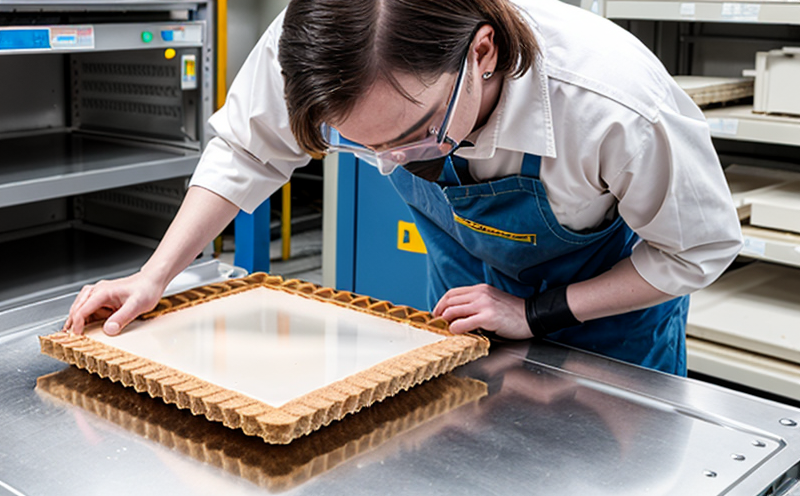IEC 60749 Wafer Thermal Cycling Stress Testing
The IEC 60749 standard is a critical benchmark in semiconductor and microchip testing, particularly focusing on the reliability of wafers and substrates. This stringent test evaluates how well semiconductors withstand extreme temperature variations that they might encounter during manufacturing or operational environments.
The process involves subjecting silicon wafers to controlled thermal cycles, typically ranging from -55°C to +125°C, with a dwell time at each extremity for specific periods. This stress testing simulates the real-world conditions these materials are expected to endure over their lifetime. The goal is to identify any weaknesses in the wafer's structure that could lead to failures under operational stress.
During this test, engineers monitor various parameters such as temperature stability, thermal coefficient of expansion (TCE), and mechanical integrity. Silicon wafers used in microchip manufacturing must maintain precise dimensions and structural integrity even after repeated exposure to these harsh conditions. Any deviation from the expected performance can indicate potential issues with the wafer's quality or the manufacturing process.
The IEC 60749 standard is widely recognized for its comprehensive approach, ensuring that wafers meet stringent reliability requirements. Compliance with this standard is essential for manufacturers looking to produce high-quality semiconductor devices that can operate reliably in diverse environments.
- Environmental factors: The test simulates real-world conditions where temperature variations are significant and frequent.
- Manufacturing precision: Ensures the wafer's dimensions remain stable under extreme thermal cycles.
- Mechanical integrity: Evaluates whether the wafer can withstand repeated stress without failure.
This testing procedure is crucial for quality control and ensuring that each wafer meets the highest standards of reliability. Non-compliance with these tests may lead to device failures, which could impact product performance and user safety.
Our laboratory adheres strictly to IEC 60749 guidelines, providing accurate and reliable test results. Our team of experts ensures that every wafer undergoes thorough testing, ensuring it meets the required standards for reliability and durability.
Applied Standards
The IEC 60749 standard is integral to our wafer thermal cycling stress testing process. This international standard defines the procedures and acceptance criteria for evaluating the thermal stability of semiconductor wafers and substrates.
The IEC 60749 guidelines specify detailed protocols for subjecting silicon wafers to temperature variations that simulate real-world conditions. The standard outlines precise dwell times at different temperatures, ensuring consistent and reliable test results. Compliance with this standard is essential for manufacturers aiming to produce high-quality semiconductor devices.
In addition to IEC 60749, our laboratory also adheres to other relevant standards such as ASTM E238, which focuses on the thermal cycling of electronic components, and ISO/IEC 17025, ensuring that our testing facilities meet international quality requirements.
The application of these internationally recognized standards guarantees that our wafer thermal cycling stress tests are conducted with precision and accuracy. This ensures that every wafer undergoes thorough evaluation to ensure its reliability under extreme temperature variations.
Industry Applications
The IEC 60749 Wafer Thermal Cycling Stress Testing is widely used in the semiconductor and microchip industry. This testing method plays a crucial role in ensuring that wafers used in manufacturing meet stringent reliability standards.
In the context of semiconductor production, this test is vital for evaluating the thermal stability of silicon wafers, which are the foundation of modern electronic devices. By subjecting these wafers to controlled temperature cycles, manufacturers can identify any potential weaknesses or defects that could lead to device failures under operational conditions.
The results from IEC 60749 testing help quality managers and compliance officers make informed decisions about product design and manufacturing processes. The data obtained from this test is essential for ensuring the reliability of semiconductors, which are critical components in various electronic devices ranging from smartphones to automotive systems.
Our laboratory's expertise in IEC 60749 testing allows us to provide reliable and accurate results that meet industry standards. We work closely with R&D engineers and procurement teams to ensure that every wafer undergoes thorough evaluation, ensuring its reliability under extreme thermal conditions.
Environmental and Sustainability Contributions
The IEC 60749 Wafer Thermal Cycling Stress Testing not only ensures the quality of semiconductor products but also contributes positively to environmental sustainability. By identifying potential weaknesses in wafers early in the manufacturing process, this testing helps reduce waste and improve resource efficiency.
- Energy savings: Through precise temperature control during the test, energy consumption is minimized.
- Material optimization: Early detection of defects allows for more efficient use of raw materials.
- Reduction in waste: By ensuring that only reliable wafers proceed to further manufacturing stages, this testing reduces the amount of unusable material sent to landfill.
The results from IEC 60749 testing provide critical insights into the environmental impact of semiconductor production. By adhering to these standards, manufacturers can adopt more sustainable practices that reduce their carbon footprint and contribute positively to a greener future.





